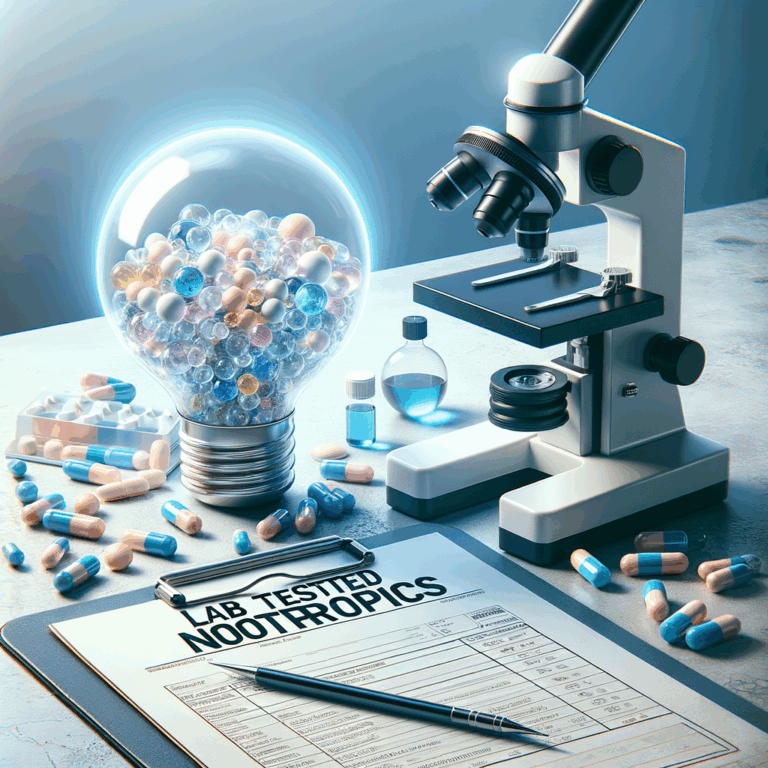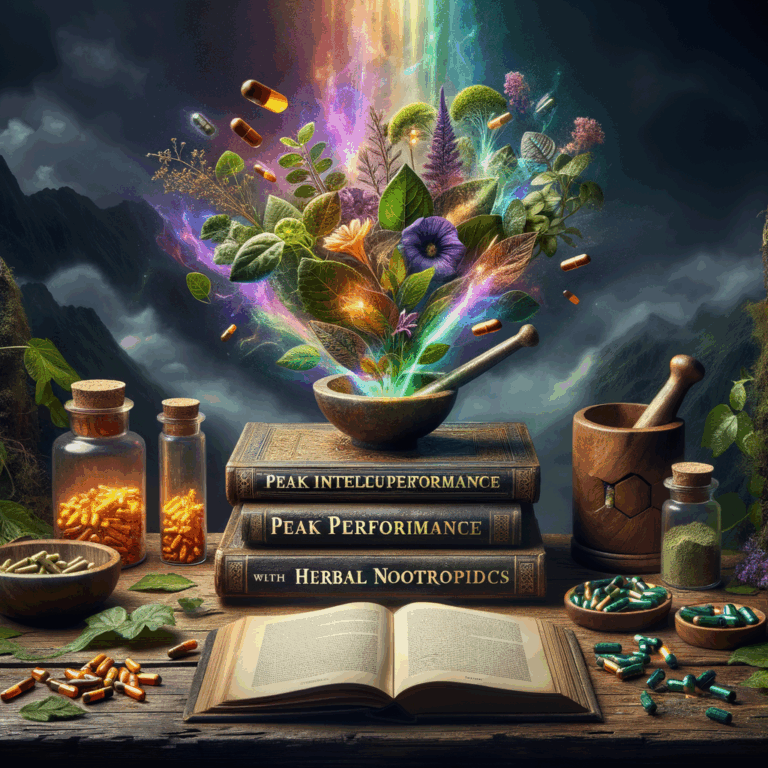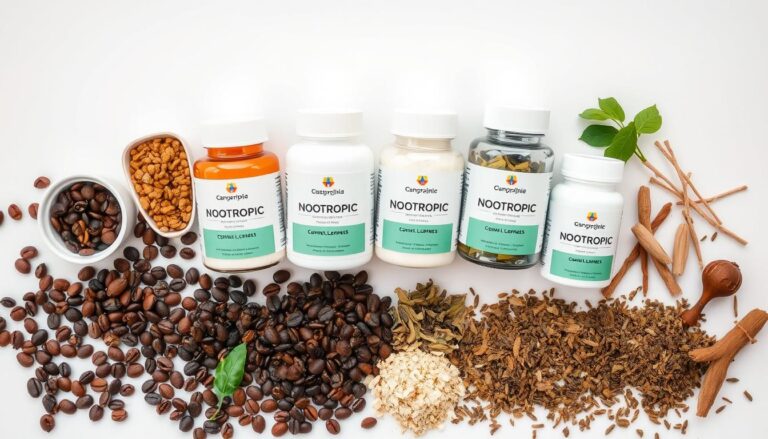- Understanding Nootropics and Their Role in Anxiety Management
- What Are Nootropics?
- How Nootropics May Alleviate Anxiety
- Popular Nootropics for Anxiety
- 1. L-Theanine
- 2. Ashwagandha
- 3. Rhodiola Rosea
- 4. Bacopa Monnieri
- 5. GABA
- Potential Benefits of Nootropics for Anxiety
- Enhanced Cognitive Function
- Reduced Anxiety Symptoms
- Improved Sleep Quality
- Stress Resilience
- How to Incorporate Nootropics into Your Routine
- Start with Research
- Consult a Health Professional
- Choose Quality Supplements
- Monitor Your Intake
- Nootropics Versus Traditional Anxiety Treatments
- Medication
- Therapy
- Lifestyle Changes
- Potential Side Effects of Nootropics
- Conclusion
- FAQs
- References
Understanding Nootropics and Their Role in Anxiety Management
Nootropics, often referred to as “smart drugs,” have gained popularity for their potential to enhance cognitive functions. But did you know these substances can also help with anxiety? Anxiety disorders affect millions of people worldwide, making effective solutions essential. Nootropics for anxiety can offer stunning solutions for improving your mood, mental clarity, and overall well-being.
This article explores the relationship between nootropics and anxiety management. You’ll learn about various nootropic options, how they work, and their potential benefits. By the end, you’ll have a solid understanding of how these substances might help you or someone you know.
What Are Nootropics?
At their core, nootropics are compounds that may enhance cognitive performance. They can boost focus, creativity, memory, and motivation. These cognitive enhancers belong to several categories, including natural herbs, synthetic compounds, and various dietary supplements.
Some popular natural nootropics include Rhodiola Rosea, Bacopa Monnieri, and L-theanine. Meanwhile, synthetic nootropics include modafinil and piracetam. They work through different mechanisms, influencing neurotransmitters, hormones, and overall brain function.
How Nootropics May Alleviate Anxiety
Anxiety often stems from imbalances in brain chemistry. Common neurotransmitters involved in anxiety include serotonin, dopamine, and gamma-aminobutyric acid (GABA). Nootropics for anxiety can help support these neurotransmitters.
Certain nootropics promote relaxation, enhance mood, or alleviate stress. They may also improve cognitive function during anxiety episodes. This can lead to better decision-making and more positive emotional regulation.
Popular Nootropics for Anxiety
1. L-Theanine
L-theanine is an amino acid found in green tea. It promotes relaxation without sedation. This makes it a suitable option for those who want to ease anxiety while staying alert.
L-theanine increases GABA levels, which helps calm the mind. It also boosts dopamine and serotonin, enhancing mood. Research shows that L-theanine can reduce stress and improve sleep quality, which is vital for anxiety management.
2. Ashwagandha
Ashwagandha is a powerful adaptogen used in Ayurvedic medicine. It’s celebrated for its ability to combat stress and enhance mental resilience. This herb works by regulating cortisol levels, the body’s primary stress hormone.
Studies suggest that ashwagandha can significantly reduce anxiety levels in those who take it regularly. It can also improve overall mood and cognitive function, making it a popular choice for anxiety relief.
3. Rhodiola Rosea
Rhodiola Rosea is another adaptogen known for its mood-enhancing properties. It helps your body adapt to stress and fatigue. This nootropic increases energy levels and promotes mental clarity.
Research indicates that Rhodiola can improve mood and reduce anxiety symptoms. Its ability to balance neurotransmitters also makes it a promising option for those struggling with anxiety.
4. Bacopa Monnieri
Bacopa Monnieri has long been used in traditional medicine for memory enhancement and anxiety relief. This herb works by promoting healthy cognitive function and reducing symptoms of anxiety.
Studies have shown Bacopa’s ability to decrease anxiety levels in participants. It may also help improve focus and memory, making it a fantastic all-around nootropic for mental wellness.
5. GABA
Gamma-aminobutyric acid (GABA) is a neurotransmitter that plays a crucial role in regulating mood and anxiety. It promotes relaxation and reduces excitability in the nervous system. Some nootropic supplements contain GABA directly, while others promote its production.
Supplementing with GABA may lead to decreased anxiety levels and improved mood. However, the effectiveness of GABA supplements can vary among individuals.
Potential Benefits of Nootropics for Anxiety
Enhanced Cognitive Function
One of the most significant advantages is the positive impact on cognitive function. Nootropics can increase focus, creativity, and mental clarity. This is especially helpful during moments of anxiety when maintaining concentration can be challenging.
Reduced Anxiety Symptoms
Nootropics like L-theanine and ashwagandha can help mitigate anxiety symptoms. By promoting relaxation and mood balance, users may experience fewer anxious thoughts and reactions.
Improved Sleep Quality
Many people with anxiety struggle with sleep. Nootropics can help improve sleep quality by addressing underlying issues. Better sleep leads to improved mood, better emotional regulation, and reduced anxiety.
Stress Resilience
Adaptogenic herbs like ashwagandha and Rhodiola Rosea may help your body adapt to stress. With regular use, these nootropics can enhance your resilience to anxiety triggers.
How to Incorporate Nootropics into Your Routine
Start with Research
Before diving into nootropic supplements, research the options that resonate with you. Look for reputable sources and scientific studies supporting each nootropic’s efficacy.
Consult a Health Professional
It’s wise to speak with a healthcare provider, especially if you have existing conditions or take medications. They can guide you on the right nootropics for your personal needs and safety.
Choose Quality Supplements
When selecting nootropic supplements, prioritize quality. Look for third-party testing, organic sourcing, and transparent labeling. Stick to reputable brands that provide clear information about their products.
Monitor Your Intake
Begin with a lower dose to see how your body reacts. Keep a journal to track your experiences, mood changes, and any side effects. This helps you determine which nootropics work best for you.
Nootropics Versus Traditional Anxiety Treatments
Medication
For many people, traditional medications like SSRIs or benzodiazepines are common treatments. While effective, these options can come with side effects. Nootropics, in contrast, can provide a more natural approach with fewer adverse reactions.
Therapy
Cognitive Behavioral Therapy (CBT) is a popular choice to manage anxiety. While therapy addresses underlying issues, nootropics may serve as a complementary tool to enhance mental wellness. They can improve the cognitive aspects of anxiety, making therapy more effective.
Lifestyle Changes
Incorporating nootropics fits well with overall lifestyle changes aimed at reducing anxiety. Regular exercise, a balanced diet, and mindfulness practices can enhance the effectiveness of nootropics.
Potential Side Effects of Nootropics
While nootropics can offer significant benefits, it’s essential to understand potential side effects. Common mild side effects may include:
– Nausea
– Headaches
– Fatigue
– Digestive issues
Always start with a lower dose to minimize risks. If you experience adverse effects, consider discontinuing use and consulting a professional.
Conclusion
Nootropics for anxiety present a promising approach to managing mood and mental clarity. With options like L-theanine, ashwagandha, and Rhodiola Rosea, individuals can explore alternatives that minimize side effects and enhance overall well-being.
Each person’s experience with anxiety is unique. Therefore, it’s crucial to research and consult with a healthcare provider for personalized guidance. By understanding and incorporating nootropics into your life, you may discover stunning solutions for improving your mood and managing anxiety.
FAQs
1. How long does it take for nootropics to work?
Nootropics vary in onset time. Some, like L-theanine, can work within an hour. Others may take weeks for noticeable effects.
2. Are nootropics safe?
Generally, most nootropics are considered safe when taken as directed. However, individual reactions can vary.
3. Can I take nootropics with other medications?
Consult with a healthcare professional before combining nootropics with other medications to avoid interactions.
4. What is the best nootropic for anxiety?
The “best” nootropic varies by individual. L-theanine and ashwagandha are popular choices for anxiety relief.
5. Do nootropics have side effects?
Potential side effects can include nausea, headaches, or digestive issues. Starting with a lower dose can help minimize these risks.
6. Can I use nootropics for chronic anxiety?
Many individuals with chronic anxiety find that nootropics help manage symptoms. However, consult a healthcare provider for personalized recommendations.
7. Is it possible to become dependent on nootropics?
Most nootropics are not addictive, unlike traditional anxiety medications. However, moderation is crucial.
8. Can I use nootropics for study or focus?
Yes! Many students use nootropics to enhance focus and cognitive performance during studying or exams.
9. Are all nootropics natural?
No, there are both natural and synthetic nootropics available. Each offers different benefits and mechanisms.
10. How do I choose the right nootropic for me?
Start with research and consider your specific symptoms or needs. Consultation with a healthcare provider is essential for personalized guidance.
References
1. Healthline – Natural Remedies for Anxiety
2. WebMD – Nootropics: Are They Safe?
3. Psychology Today – The Science of Nootropics
By understanding the potential of nootropics for anxiety management, you can take steps toward better mental wellness and a calmer life.



